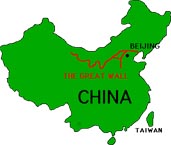China talks tough over trade protectionism
 Beijing - Many Western politicians have accused China of trade protectionism in recent months, sometimes with reason and sometimes apparently seeking a convenient economic scapegoat.
Beijing - Many Western politicians have accused China of trade protectionism in recent months, sometimes with reason and sometimes apparently seeking a convenient economic scapegoat.
Yet most Chinese economists see double standards in the West's finger-pointing.
President Hu Jintao was expected to reiterate China's opposition to protectionism and again champion developing nations when he attends next week's dialogue between the Group of Eight (G8) and emerging economies.
"The biggest issue (for China) is the protectionism in trade," Zhang Hanlin, director of the World Trade Organization (WTO) Institute at Beijing's University of International Business and Economics, told the German Press Agency dpa.
Zhang said he saw signs of abuse of the WTO's anti-dumping, anti-subsidy and insurance regulations by the United States and the European Union "in all areas", but "mainly in industrial products."
In a policy speech in mid-June to the State Council, or cabinet, Premier Wen Jiabao identified international trade protectionism as one of the "many uncertainties" threatening to undermine China's economic recovery.
"Actually, after China joined the WTO in 2001, from 2002 to 2006 the US made the most appeals for anti-dumping and other issues," said Jin Fang, a senior researcher at the World Economic Institute under the Shanghai Academy of Science.
"But after 2006, the EU had the loudest voice," Jin told dpa.
"What's more, the EU puts much stress on environmental protection," she said, adding that to China that policy was "protectionism with green clothes."
WTO standards for safety and labour could also cause more trade disputes between Western nations and China, Jin said.
"They should accept that Asian countries are still developing," she said.
Jin's and Zhang's remarks seem broadly in line with the government's position and come as China faces a series of complaints over its own trade practices.
The United States and the European Union filed complaints with the WTO in late June over China's restrictions of exports and hoarding of nine raw materials used by the steel, aluminium and chemical industries.
"The Chinese restrictions on raw materials distort competition and increase global prices, making things even more difficult for our companies in this economic downturn," EU Trade Commissioner Catherine Ashton said.
But China responded by saying it imposed the limits on exports of raw materials including bauxite, coke, magnesium, zinc and silicon to "protect the environment and natural resources."
In mid-June, China ordered local governments to buy products and services from domestic firms where possible.
The central government justified the move by saying it was only "levelling the playing field" after complaints that low tariffs for some imports had favoured foreign firms in bidding for contracts under a 4-trillion-yuan (590-billion-dollar) two-year stimulus package.
The EU Chamber of Commerce accused China of largely preventing foreign firms from undertaking projects linked to the stimulus package.
Ben Simpfendorfer, an economist with the Royal Bank of Scotland in Hong Kong, said the government's new move was "in short, a 'Buy China' policy."
"The edict will spur protectionist sentiment and is at odds with worries about the country's export sector," Simpfendorfer said in a briefing note.
Other recent trade disputes cover issues including US limits on Chinese poultry and steel imports.
China's plans to order pre-installation of Green Dam internet "firewall" software on all new computers from July 1 also attracted criticism for allowing what the West considers to be unacceptable levels of censorship and invasion of privacy.
But some analysts see China's differences with the United States and Europe over Green Dam as another trade spat, rather than a rights issue.
"They would not complain if we used US software," Jin said of the dispute over Green Dam.
"They complain when we use our own software, don't you think that's strange?" she asked.
Despite the strong rhetoric, the prospects of any trade war in the near future appear slim, with Chinese, US and EU officials all saying they are committed to dialogue.
"The ongoing global financial crisis has given rise to protectionism worldwide," Minister of Commerce Chen Deming wrote in state media in April.
"Since it has been a victim of anti-dumping measures for a long time, China should push forward free trade and safeguard multilateral trade rules to overcome the crisis as early as possible," Chen said. (dpa)